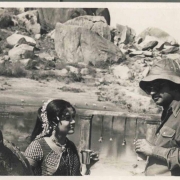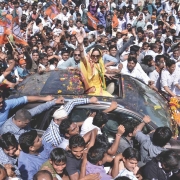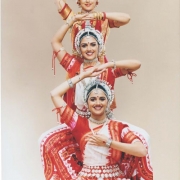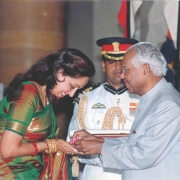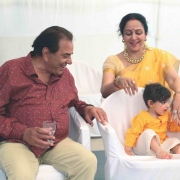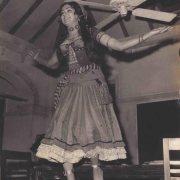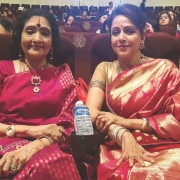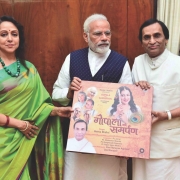
People
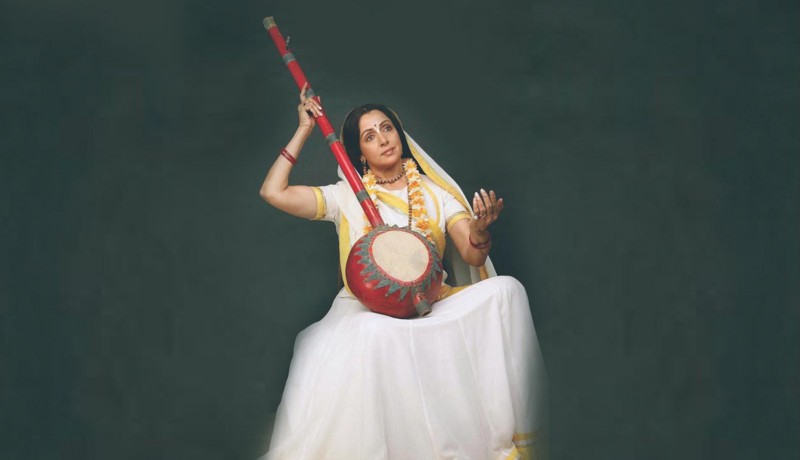
Hema Malini has admirably transitioned from filmstar of yore to politician of the day. Celebrating the life and times of one of Indian cinema’s greatest stars
For over 50 years, she has danced her way into the hearts and fantasies of moviegoers across generations. All of 19, she was the fresh new face starring opposite Raj Kapoor in her debut film Sapno Ka Saudagar (1968), and her title as the ‘Dream Girl’ of Bollywood was further sealed when she played five different characters in the movie Dream Girl (1977).
We have watched Hema Malini’s larger-than-life personality essay some of the most memorable female characters in Bollywood history. Geeta’s rambunctious attitude in Seeta Aur Geeta (1972) and Basanti’s fierce and bubbly spirit in the iconic Sholay (1975) have left an indelible mark. She also delivered a touching performance in Aruna Raje’s Rihaee (1988), in which she shared a kissing scene with Vinod Khanna, a bold move for the time.
But beyond Hema Malini’s piercing eyes, luscious hair and porcelain skin, beyond the Dream Girl, is a savvy woman who not only honed her skills as a dancer and actor but immersed herself in others sides of filmmaking, including direction, production and singing. In fact, she gave Shah Rukh Khan his big break when she directed him opposite the late Divya Bharti in Dil Aashna Hai (1992).
Life in the limelight, however, comes with an intrusive price. From her controversial wedding to co-star Dharmendra to a controversial road accident in Dausa, Rajasthan, a few years ago, Malini’s personal life has been put under a very public spotlight. Over the years, however, she has learned to take it in stride. “In most cases, I feel the media has attacked me because either I am a celebrity or a representative of a political party. But I have never wanted to run away from this attention; that’s not me! I have always faced situations in my life, and escapism is not my forte,” she tells us in an email interview.
In the recently released authorised biography Hema Malini: Beyond the Dream Girl (read review: The Quintessential Dream Girl), by her long-time biographer and friend Ram Kamal Mukherjee, Malini ventures to set the record straight. She speaks about her journey as a classical dancer, the ebb and flow of her career in film, her relationship with her family, and her newfound passion for politics and public service.
Indeed, on the work front, a lot has changed. Films have taken a backseat these days, with all her attention focused on her role as a Member of Parliament. Dance, however, remains an integral part of her life—she is currently working on a ballet production with Natyavihar Kalakendra, an institution of dance and culture she founded. She also takes her role as a grandmother to her daughters’ children seriously.
An ardent devotee of Lord Krishna, it suits her well to have been elected to the Lok Sabha constituency of Mathura, a Vaishnavite hub in Uttar Pradesh, in the 2014 General Elections. These days, when the superstar is not tackling civic issues and building bridges, schools and toilets, she is busy looking into providing adequate water supply and developing healthcare in Mathura.
EXCERPTS FROM AN EMAIL INTERVIEW
The book is rather personal. It’s almost as if you are setting the record straight…. Were there some hard-to-recall moments?
When Ram Kamal Mukherjee wanted to write a book on me, I was wondering what could be the content, considering the fact that he has already written a coffee-table book on me in 2005. Bhawana Somaaya has also written a biography on me. But Ram was persistent and finally convinced me to talk about all the untold stories, those that were probably missed out in the previous books.
He was right, because when I read the manuscript, I realised he has managed to extract facts in a way that set all the records straight. There were several ‘hard-to-recall’ moments, but when you have an author who has studied his subject so well, you can only let yourself open up and speak your heart out. As far as the ‘controversial’ accident chapter is concerned, I think Ram Kamal dealt with it rationally. He didn’t take sides; he just reported the story.
I believe your brothers Kannan and Jagannath played an important role in filling the void your father left. Do they remind you of him?
My father used to compere all my shows; he was excellent in English and Hindi. It was magical the way he would introduce me on stage. In 1976, I had to perform at Netaji Indoor Stadium in Kolkata for an audience of 5,000. My father fell ill before the show and, naturally, I decided to cancel it because I didn’t feel anyone else would be able to compere the show. That’s when my brother said that he would do it. Since then he has been travelling with me for all my shows. I can even go as far as to say his English and Hindi is a little better than dad’s! Both Kannan and Jagannath are extremely protective of me, just like my father. So yes, with age, I can see reflections of our father in both of them.
As a dancer, you were heir to Vyjayantimala’s throne in the film industry. The first film you ever watched was Nagin…. What kind of a relationship did you share with her?
Vyjayantimalaji is like an elder sister to me. When I was young, I used to watch her dance as a fan. I was mesmerised by her grace and beauty when my mother and I met her backstage after one of my Bharatanatyam performances; she looked radiant in a Kanjivaram saree. Years later, when I joined the film industry, I met her on several occasions. But one of the most special days of my life was when Ram Kamal surprised me at an award show; he had asked Vyjayantimalaji to give me the award.
I believe your daughters’ favourite scene is when they see you on the ceiling fan in Seeta Aur Geeta. Were you nervous when you learnt you had to do what is now considered an iconic stunt?
Yes! I asked Ramesh Sippy to show me each and every movement. In Beyond The Dream Girl, he has written a beautiful ‘Afterword’ and mentioned in detail how he used to convince me to do all the stunts.
You made your directorial debut, Dil Aashna Hai, with Shah Rukh Khan much before he became the uncrowned king of Bollywood. What were your first impressions of him?
More than what I thought of him, I think my guru Ma Indira Devi predicted that Shah Rukh will be India’s biggest superstar. He was full of energy and an extremely talented boy. I think he got married to Gauri while he was shooting Dil Aashna Hai. He used to rattle off his dialogues very fast; I would keep telling him, “Lafzon ko feel karke, aaram se bolo!” I think by the end of the movie he was a completely different person, he knew what works on screen and what doesn’t.
In the book you say, “I always used to think that when I marry, I will marry someone like him.” All these years later, how has your relationship with Dharmendra evolved?
I think a relationship lasts longer when you provide space to your partner. Dharamji spends most of this time at his farmhouse in Lonavala, where I go and spend time with him. But owing to my work commitments, I keep travelling and barely get to spend time with him. He admires the fact that I keep myself engaged with dance and work hard for my constituency, Mathura. Nothing has changed between us; in fact, with time we are discovering a stronger bond.
You have made it very clear that there is no inclination to make time for ordinary mother-type roles in movies that are reserved for older women actors….
I think there are many subjects that can be addressed. Unfortunately, neither producers nor studios show any interest in women-centric subjects. If you see Meryl Streep and Judi Dench, you will know what I mean. Look at their screen presence and persona. Why can’t we have a film like Mamma Mia (2018) or The Devil Wears Prada (2006)? We have such brilliant actors like Rekha, Jaya Bachchan, Shabana Azmi, and many more, who are only offered ‘supporting’ roles in films. Why? In regional cinema, we have films for all kinds of audiences. I think Bollywood should think differently.
What has age brought to your craft and technique?
I completed 50 years in this industry; abhi tak toh koi bhi seekh jayega!
You did Baghban, which shed light on silvers being ill-treated by their children and yet showed the romance between two older people….
What we see on screen is a dramatic representation of real life. So many people came up to me personally and thanked me for doing a film like Baghban. I am not judging anyone, but I think the nuclear family works better these days because of financial reasons. That doesn’t mean we have to abandon our parents or grandparents. I can’t even imagine having lived my life without my parents, but there are kids who are not so attached to their parents or family members, sometimes because they study abroad and then settle there with a permanent job. My daughter Esha lives in a joint family, and she gives credit to her mother-in-law for beautifully handling each and everyone in the family. I am sure Ahaana has learnt a lot from her in-laws too. Both my daughters believe in family―joint or nuclear―that’s what they learnt from me.
Your daughter Ahaana has spoken about how lenient your disciplinarian mother was towards her grandchildren. Now that you are a grandmother yourself, do you empathise with her on that?
Yes, I am very fond of Darien and Radhya. Of course, I am lenient towards them; that’s only natural. Esha and Ahaana are disciplinarian mothers, so I guess that balances the equation. I am thankful to God for everything in life. I am nothing without the support and love I always get from my husband, daughters, sons-in-law, and now my grandkids.
As an MP, has your public responsibility changed?
Yes! I mean my constituents like me as a filmstar, but I also need to deliver. If I fail, they will not elect me the next time. I want to do a lot of work in Mathura, and I think people like my work and dedication.
In your initial days at the Lok Sabha, L K Advaniji had some words of wisdom for you. He said, “You keep attending, you’ll like it and automatically learn what to do.” Was he right?
Yes! Just by attending Parliament I learnt how well-read everyone is. I come from a different background and was initially selected as a Rajya Sabha member. In films, we are used to written dialogues and don’t have do think much. Bas line theek se bol do, aur shot okay ho jata hai. But in Parliament, you need to know a lot about your nation. You need to choose your own words carefully. If I can speak fearlessly in Parliament, it’s because of my observation over the years.
Are there ever moments of self-doubt?
No, I am very certain about things that I do.
What are some of the most important lessons learnt along the way?
Don’t think too much. God gives you the opportunities; you just need to do your work diligently. The rest is your karma.
What is your beauty and health regimen on a normal day?
The basic requirement of keeping yourself healthy is to think positive. It might sound a bit philosophical, but it’s the best medicine. You also need to pay heed to your physical regime. I do yoga every day; I am not into hardcore gymming but Esha taught me a few modern techniques, which I do once or twice a week. After my accident, I had to go easy on my workouts; but slowly and steadily, I got back to my normal routine. Food is one of the most important aspects of health. I am a pure vegetarian and don’t indulge in partying and late-night socialising. Early to bed and early to rise is my mantra. Above all, dance keeps me going. That’s the secret of my fitness. I drink a lot of water, juices, milkshakes when I am campaigning. I prefer fruits to junk food.
What is your fondest childhood memory?
I had a very ordinary childhood and never got an opportunity for mischief. But I fondly remember when I was growing up in Delhi, my friend Dillo (Nandita), who was a Krishna devotee too, and I would visit Birla Mandir and spend time with Lord Krishna.
It seems you harbour a secret love for painting….
Yes, I love to paint, but I barely get time these days. I like to paint nature, God’s most beautiful creation.
– Natasha Rego
January 2019
you may also like to read
-
For the love of Sanskrit
During her 60s, if you had told Sushila A that she would be securing a doctorate in Sanskrit in the….
-
Style sensation
Meet Instagram star Moon Lin Cocking a snook at ageism, this nonagenarian Taiwanese woman is slaying street fashion like….
-
Beauty and her beast
Meet Instagram star Linda Rodin Most beauty and style influencers on Instagram hope to launch their beauty line someday…..
-
Cooking up a storm!
Meet Instagram star Shanthi Ramachandran In today’s web-fuelled world, you can now get recipes for your favourite dishes at….




